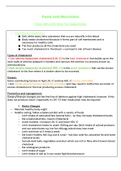Food and Nutrition
FOOD-RELATED HEALTH CONDITIONS:
1. High Blood Cholesterol
● Soft, white waxy, fatty substance that occurs naturally in the blood
● Body needs cholesterol because it forms part of cell membranes and is
necessary for healthy cells
● The liver produces all the cholesterol you need
● Too much cholesterol in the blood → can lead to risk of heart disease
Types of cholesterol:
> Low-density lipoprotein cholesterol (LDL-C) is the 'bad' cholesterol that builds up on the
inner walls of arteries (plaque); it hardens and narrows the arteries in a process known as
arteriosclerosis.
> High-density lipoprotein cholesterol (HDL-C), is the 'good' cholesterol that carries excess
cholesterol to the liver where it is broken down to be excreted.
Causes:
Some contributing factors to high LDL-C and low HDL-C can be controlled
→ but certain genetic factors cannot be controlled and may result in ineffective excretion of
excess cholesterol or the liver producing excess cholesterol
Prevention and management:
Dietary/lifestyle changes are the first line of defence against high cholesterol, however, if this
does not produce result ( especially in LDC-C) then medication may be required
1. Dietry Changes
• Maintain healthy body wight
• Healthy eating: follow a balanced diet with a variety of foods
- Limit intake of saturated fats (animal fats) - as they increase cholesterol levels
- Eat unsaturated fats- lowers cholesterol
- Avoid transfat : increase LDL-C and lower HDL-C
- Limit cholesterol intake to under 300mg per day (limit intake of animal products
and use substitutes e.g. low fat milk,egg substirutes, lean meat
- Limit red meat to 3 times a week
- Eat heart-healthy fish (e.g cod & tuna) - has less total fat, saturated fat and lower
cholestal levels
- Include dark leafy vegetables and druit which are rich in fibre which lowers blood
choletsral
- Eat wholegrain products
- Limit intake of sugar
- Limit intake of salt as it can cause high blood pressure
, - Increase intake of legumes (low in fat)
- Take in more soluble fibres (apples, rolled oats, legumes etc.) low in fat and lower
cholestral
Unsaturated fats
Lowers LDL
MONO-unsaturated: Olive oil,
peanut oil, canola oil, olives,
avocado, peanut butter, many raw
nuts and seeds
POLY-unsaturated: mainly in
vegetable oils – sunflower, soya
and corn oil, soft margarines, fatty
fish - salmon, mackerel, trout, many
nuts and seeds
Saturated fats
Animal sources (products) ,
coconut oil, palm oil
Increases blood cholesterol
levels
Trans fats
Caused by chemical changes
(hydrogenation) in oils (deep fat
frying, hard margarines)
Very unhealthy Increases LDL
The Heart and Stroke Foundation South Africa uses this emblem, Heart mark, as a guideline
for consumers to immediately identify healthy products on the shelf.
The Heart mark indicates that a product is:
> low in cholesterol
> low in saturated fats
> low in sodium
> low in added sugars
> high in fibre
2. Lifestyle changes
● Use alcohol moderately, i.e. no more than one drink per day for women and two per day
for men.
● Exercise regularly -try to be physically active for 30 to 60 minutes per day, which
includes walking, gardening and climbing stairs.
● Do not smoke.
3. High Blood Pressure/ Hypertension
• High blood pressure is a common condition in which the pressure of the blood against the
arterial walls is so high that it can cause health problems such as heart diseases.
• Blood pressure is determined by how much blood the heart pumps and the amount of
, resistance the arteries provide against the flow of blood.
• The more blood the heart pumps and the narrower the arteries, the higher the blood
pressure
• It can eventually lead to serious health problems such as a heart attack or a stroke.
• Normal is 120/80
Causes:
• Excessive salt intake
• Smoking
• Overweight
• Lack of physical activity
• Insufficient intake of dairy, fruit and vegetable (Calcium, potassium and magnesium)
• Excessive alcohol consumption
• Stress
• Ageing
• Certain medication
• Family history
• Chronic kidney failure
• Adrenal and thyroid problems
Management and prevention:
● Can largely be controlled by diet and lifestyle changes
1. Dietary changes
• Less salt
• No more than 5 g per day
• High salt products = more than 1,5g/100g or 600g sodium/100g
• Whole grains high in fibre
• Low fat dairy
• Food rich in potassium, calcium and magnesium
• Less saturated fats
• maintain body weight
2. Lifestlye changes
• Exercise more
• Moderate alcohol consumption
• Limit intake of coffee/tea
• Do not smoke
• Manage stress
4. Osteoporosis
● means porous bones
● Serious skeletal disease due to an excessive loss of protein and minerals, especially
calcium
● ‘silent disease’ = no visible symptoms until first bone fracture




